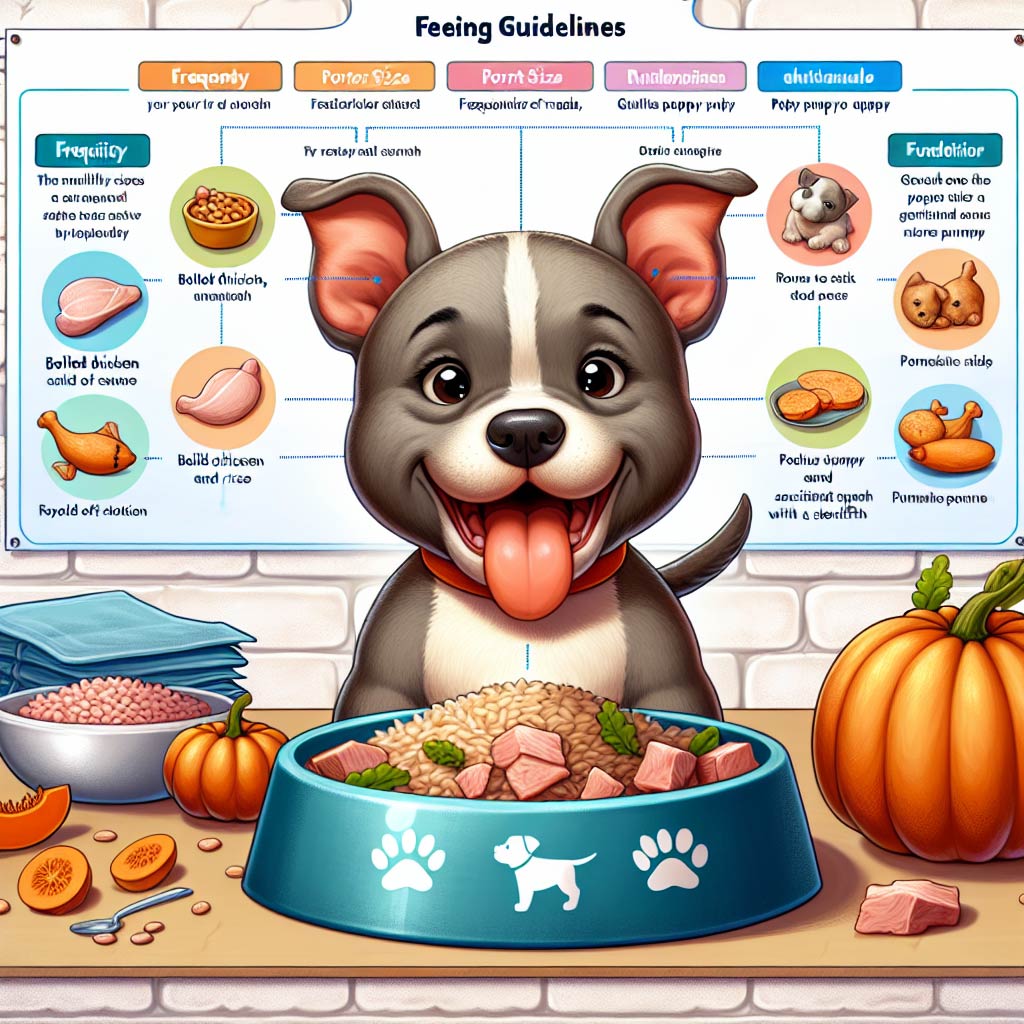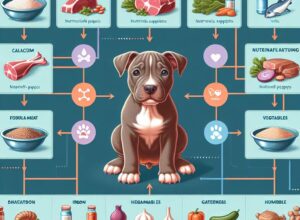
Paving the Path to a Happy Tummy: Dietary Choices for Your Sensitive Stomach Pitbull Puppy
When your pitbull puppy has a sensitive stomach, every meal can feel like a minefield. But worry not, because with the right knowledge and a dash of patience, you can ensure your furry friend enjoys their food without any tummy troubles. It’s all about finding the perfect balance of nutrients that sits well with your pup’s digestive system. Let’s get started on this journey to a happier, healthier puppy.
Identifying Your Puppy’s Stomach Sensitivities
First things first, let’s figure out what’s causing your pitbull puppy’s sensitive stomach. Is it a certain protein source? Too much fat? Or perhaps a grain that doesn’t agree with them? Keep a close eye on your puppy after meals and note any signs of discomfort. This could be anything from gas and bloating to diarrhea or vomiting. Once you spot a pattern, you’ll have a clearer idea of which ingredients to avoid.
- Observe your puppy’s reaction to different foods
- Note any signs of digestive distress
- Keep a food diary to track what you’re feeding them and their reactions
- Consider an elimination diet to pinpoint the culprit
- Consult with your vet for professional advice
Role of High-Quality Ingredients in Puppy Diets
Quality is king when it comes to your puppy’s diet, especially if they have a sensitive stomach. Opt for foods that boast whole, identifiable ingredients. Avoid fillers and additives that can irritate your pup’s gut. A diet rich in lean proteins, easily digestible carbohydrates, and the right kind of fats will make all the difference. Remember, a premium diet might cost a bit more, but it’s an investment in your puppy’s long-term health and happiness.
- Choose diets with whole, natural ingredients
- Avoid artificial colors, flavors, and preservatives
- Look for lean proteins like chicken or fish
- Seek out complex carbs like sweet potatoes for easy digestion
- Ensure the food has a balance of omega fatty acids for a healthy coat and skin
Beyond the Bowl: Understanding Sensitive Stomachs
Having a sensitive stomach isn’t just about what your pitbull puppy eats—it’s also about their overall health and environment. Stress, eating habits, and even their playtime can influence their digestive system. It’s important to look at the big picture to truly understand and support your puppy’s needs. A happy puppy is a puppy with a happy tummy.
Contributing Factors to Gastrointestinal Sensitivities
Several factors can contribute to your pitbull puppy’s sensitive stomach. It could be genetic, or perhaps they’re just naturally prone to digestive issues. Sometimes, it’s the little things that can cause an upset—like gobbling down their food too quickly or snacking on something they shouldn’t. Even changes in their routine or environment can trigger stomach sensitivities. Pay attention to these factors and you’ll be better equipped to manage your pup’s diet and lifestyle.
- Genetics may play a role in your puppy’s stomach sensitivities
- Eating too quickly can cause indigestion
- Environmental changes can upset your puppy’s stomach
- Non-dietary ingestions, like trash or toys, can be harmful
- Stress and anxiety can also lead to digestive issues
Spotting the Telltale Signs and Symptoms
Knowing when your pitbull puppy is struggling with their diet is crucial. Look out for symptoms like chronic diarrhea or constipation, which can be red flags. Vomiting, excessive gas, and a gurgling stomach are also signs that something isn’t quite right. If your puppy is experiencing these symptoms regularly, it’s time to reassess their diet and possibly consult your vet.
- Chronic diarrhea or constipation
- Vomiting after meals
- Excessive gas that clears the room
- A gurgling stomach that’s hard to ignore
- Lack of appetite or aversion to food
- Weight loss or poor weight gain
- Dull coat or skin problems
Nutrition Navigation: Foods to Sidestep and Embrace
Choosing the right foods for your pitbull puppy with a sensitive stomach is like navigating a labyrinth. But with a bit of guidance, you can find a clear path to a diet that supports their health without causing distress.
Steering Clear of Troublesome Ingredients
Some ingredients are notorious for causing digestive issues in puppies. It’s best to avoid foods with high-fat content, as they can be hard to digest. Cheap fillers like corn, wheat, and soy can also lead to inflammation and aren’t ideal for a sensitive stomach. And while it might be tempting to go grain-free, be cautious, as some grain-free diets have been linked to heart issues in dogs.
Remember, every puppy is different. What upsets one stomach may not bother another. It’s about finding what works for your pitbull.
Selecting Safe and Soothing Foods
On the flip side, there are foods that can help soothe your puppy’s sensitive stomach. Easily digestible proteins like boiled chicken or turkey are gentle on the stomach. Pumpkin and sweet potatoes are great sources of fiber that aid in digestion without being too harsh. Look for foods with probiotics and prebiotics, as they promote a healthy gut flora, which is essential for digestion.
- Boiled chicken or turkey for easily digestible protein
- Pumpkin and sweet potatoes for gentle fiber
- Probiotics and prebiotics to support gut health
- Fish oil supplements for omega-3 fatty acids, which can reduce inflammation
- Small amounts of plain yogurt to provide live cultures
Mastering the Meal: Diet Transition and Frequency
Transitioning your pitbull puppy to a new diet should be done slowly and with care. Start by mixing a small amount of the new food with their current food, and gradually increase the new food over the course of a week or two. This gives your puppy’s digestive system time to adjust and can prevent any additional upset.
When it comes to meal frequency, puppies typically do best on multiple small meals throughout the day. This keeps their energy levels stable and doesn’t overwhelm their sensitive stomachs. As they grow, you can adjust the number of meals according to their needs and your vet’s advice.
- Mix new food in gradually over a week or two
- Feed multiple small meals instead of one or two large ones
- Adjust meal size and frequency as your puppy grows
- Always have fresh water available
- Monitor your puppy’s reaction to the new diet closely
Blueprint for a Gradual Diet Shift
Changing your pitbull puppy’s diet isn’t something you should rush. Think of it as a slow dance rather than a race. Start by introducing the new food at about 25% of their meal, mixed with 75% of their old food. Over the next 7-10 days, increase the new food by 25% while decreasing the old food by the same amount. This gradual switch helps your puppy’s digestive system adapt without shock.
- Day 1-3: 75% old food, 25% new food
- Day 4-6: 50% old food, 50% new food
- Day 7-9: 25% old food, 75% new food
- Day 10: 100% new food
- Watch for any signs of digestive upset during the transition
- Be ready to adjust the transition pace based on your puppy’s response
Decoding the Optimal Feeding Schedule
Young puppies have small stomachs and high energy needs, so they require more frequent feedings. Aim to feed your sensitive stomach pitbull puppy three to four times a day. As they grow and their stomach capacity increases, you can gradually reduce the number of meals. Always ensure fresh water is available, especially after meal times to aid in digestion.
- 3-4 meals per day for puppies under six months
- 2-3 meals per day for puppies six months to one year
- Consistent meal times help regulate your puppy’s digestive system
- Measure each portion to maintain a healthy weight
- Observe your puppy’s hunger cues and adjust as needed
Power of Supplements: Boosting Digestive Health
While a balanced diet is the cornerstone of good health, supplements can provide additional support, especially for puppies with sensitive stomachs. They can fill nutritional gaps and promote better digestion. However, it’s important to choose the right supplements and administer the correct dosages to avoid any adverse effects.
Probiotics: The Gut Balancing Game Changer
Probiotics are beneficial bacteria that live in the gut and play a crucial role in digestion and overall health. Adding a probiotic supplement to your pitbull puppy’s diet can help maintain a healthy balance of gut flora, which is particularly important for puppies with sensitive stomachs. Look for supplements specifically designed for dogs, and follow the dosage instructions carefully.
- Probiotics support a healthy digestive tract
- They can help reduce symptoms like diarrhea and gas
- Choose a dog-specific probiotic supplement
- Introduce probiotics slowly to avoid digestive upset
- Consult your vet for the best probiotic choice for your puppy
Essential Nutritional Supplements and Dosages
Apart from probiotics, other supplements can support your puppy’s sensitive stomach. Digestive enzymes can help break down food more efficiently, while omega-3 fatty acids from fish oil can reduce inflammation in the gut. Always start with the lowest recommended dose and monitor your puppy’s response. Your vet can provide guidance on the best supplements and appropriate dosages for your puppy’s specific needs.
- Digestive enzymes aid in breaking down fats, proteins, and carbohydrates
- Omega-3 fatty acids from fish oil can soothe an inflamed digestive system
- Start with the lowest dose and observe your puppy’s reaction
- Adjust dosages as recommended by your vet
- Ensure the supplements are high-quality and free from contaminants
When Home Remedies Aren’t Enough: Seeking Professional Care
There comes a point when your at-home efforts and remedies may not be enough to soothe your pitbull puppy’s sensitive stomach. It’s crucial to recognize when it’s time to seek professional veterinary care. Your vet can offer a level of insight and diagnostic capabilities that go beyond what you can do at home. They can help you get to the root of the issue and develop a plan to get your puppy back to feeling their best.
Signs That Indicate a Vet Visit Is Necessary
While occasional digestive upset isn’t uncommon, certain signs should prompt an immediate call to your vet. If your puppy is experiencing persistent vomiting or diarrhea, especially if it’s accompanied by blood, it’s time to seek professional help. Other red flags include a sudden loss of appetite, lethargy, or any signs of pain or distress. Weight loss or dehydration can also occur with ongoing stomach issues and should be addressed promptly.
- Persistent vomiting or diarrhea, especially with blood
- Sudden loss of appetite or refusal to eat
- Lethargy or disinterest in play
- Signs of pain, such as whining or a hunched back
- Weight loss or signs of dehydration
Working With Your Vet to Craft a Custom Diet Plan
Partnering with your vet is the best way to create a diet that’s tailored to your pitbull puppy’s specific needs. Your vet may recommend diagnostic tests to rule out any underlying conditions. Once you have a clear picture of what’s causing the stomach sensitivities, your vet can help you select the right food and supplements. They may also provide guidance on portion sizes and feeding schedules that are optimal for your puppy’s health.
- Consult with your vet for a tailored diet plan
- Diagnostic tests can help identify underlying issues
- Selection of appropriate food and supplements
- Guidance on portion sizes and feeding frequency
- Regular check-ups to monitor your puppy’s progress
Key Takeaways: Article-at-a-Glance
Here’s a quick rundown of the essential points we’ve covered:
- Identify your pitbull puppy’s stomach sensitivities by monitoring their reactions to different foods.
- Choose high-quality ingredients and avoid known irritants like high-fat content and cheap fillers.
- Understand that a sensitive stomach can be influenced by genetics, eating habits, and environmental factors.
- Transition to new foods gradually and maintain a consistent feeding schedule.
- Supplements like probiotics and digestive enzymes can support digestive health.
- Know when to seek veterinary care for persistent or severe symptoms.
- Work with your vet to create a custom diet plan for your puppy’s unique needs.
Frequently Asked Questions (FAQ)
What are common signs of sensitive stomach in Pitbull puppies?
Common signs include intermittent loose stools, occasional vomiting, excessive gas, and a gurgling stomach. If these symptoms are frequent, it’s a sign that your puppy’s diet may need adjustment.
Are grain-free diets safe for Pitbull puppies with sensitive stomachs?
Grain-free diets have been popular, but they’re not suitable for all dogs. Recent studies have linked some grain-free diets to heart issues in dogs. Always consult with your vet before making significant changes to your puppy’s diet.
How can I transition my puppy to a new sensitive stomach diet safely?
Start by mixing a small amount of the new food with their current food and gradually increase the proportion over a week or two. This slow transition helps prevent digestive upset.
What supplements can help my Pitbull puppy’s sensitive stomach?
Probiotics, prebiotics, and digestive enzymes can be beneficial. Supplements like fish oil can also help by reducing inflammation in the digestive tract.
When should I consult a vet for my puppy’s sensitive stomach issues?
If your puppy has persistent or severe symptoms like vomiting, diarrhea, weight loss, or lethargy, it’s time to consult your vet. They can provide a diagnosis and a tailored treatment plan.
What are common signs of sensitive stomach in Pitbull puppies?
Spotting a sensitive stomach in your Pitbull puppy can be straightforward if you know what to look for. The most common signs include intermittent loose stools or diarrhea, occasional vomiting, and excessive gas that could clear a room. A gurgling stomach, lack of appetite, and a general sense of malaise can also indicate that your puppy’s diet isn’t agreeing with them. If you notice these symptoms, especially after meals, it’s time to reassess what you’re feeding your little companion.
Are grain-free diets safe for Pitbull puppies with sensitive stomachs?
Grain-free diets have been all the rage, but they aren’t a one-size-fits-all solution. While some puppies do well on grain-free diets, others might not. In fact, some grain-free diets have been linked to an increased risk of dilated cardiomyopathy (DCM), a heart condition, in dogs. The key is to focus on digestibility and quality, whether the food contains grains or not. Always talk to your vet before switching to a grain-free diet to ensure it’s the right choice for your Pitbull puppy.
How can I transition my puppy to a new sensitive stomach diet safely?
Transitioning your puppy to a new diet should be a gentle process. Start by mixing a small portion of the new food with their current one. Over the next 7-10 days, gradually increase the amount of the new food while decreasing the old food. This slow and steady approach helps your puppy’s digestive system adjust without causing additional stress. Keep an eye on their stool consistency and behavior, and if you notice any issues, slow the transition even further.
What supplements can help my Pitbull puppy’s sensitive stomach?
Supplements can be a great addition to your Pitbull puppy’s diet, especially if they have a sensitive stomach. Probiotics can help balance the good bacteria in the gut, while prebiotics feed those beneficial bacteria. Digestive enzymes can aid in breaking down food, making it easier for your puppy to absorb nutrients. Omega-3 fatty acids, found in fish oil, can reduce inflammation in the gut. Always start with small doses and consult your vet for the best supplement strategy for your puppy.
When should I consult a vet for my puppy’s sensitive stomach issues?
If your puppy’s symptoms are persistent, severe, or if you notice any blood in their stool or vomit, it’s time to call the vet. Other red flags include a sudden change in appetite, weight loss, lethargy, or any other behavior that isn’t normal for your puppy. Your vet can help you identify the cause of the sensitivity and develop a plan to manage it, ensuring your puppy grows up healthy and happy.
In conclusion, managing a sensitive stomach in your Pitbull puppy requires a combination of careful observation, patience, and willingness to adapt. By recognizing the signs of stomach sensitivity, choosing the right diet, understanding the role of supplements, and knowing when to seek professional help, you can provide the best care for your growing pup. Remember, every puppy is unique, and what works for one may not work for another. Stay attentive, be proactive, and always prioritize your Pitbull puppy’s health and comfort. With the right approach, you’ll find the path to a happy tummy and a joyful, energetic companion for years to come.



